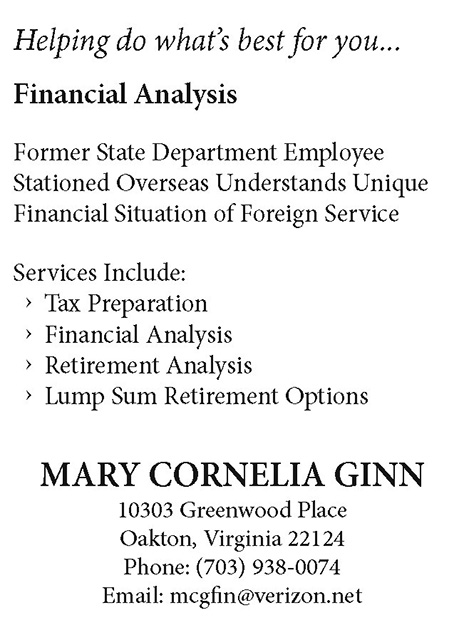2020 Awards for Constructive Dissent
Christian A. Herter Award for a Senior Foreign Service Officer
JULIE M. STUFFT: PROTECTING AMERICANS DURING A PANDEMIC

Julie Stufft.
On detail to the National Security Council, Senior Foreign Service Officer Julie Stufft worked to protect American citizens abroad in the early days of the pandemic. She advocated policies that some senior officials initially viewed as unthinkable, but ultimately proved essential in limiting the spread of COVID-19. Many of these, such as global travel advisories, State and Centers for Disease Control and Prevention independence in issuing travel guidance, and advisories for all U.S. citizens against traveling on cruise ships, were eventually adopted by the executive branch.
At the NSC, Ms. Stufft served as special assistant to President Donald Trump and senior director for border and transportation security—the first State Department detailee to hold the position. As the most senior FSO working in a policy position in the White House, she courageously advocated, at the highest levels of the U.S. government, for the core mission of the Foreign Service: protection of, advocacy for, and clear and accurate guidance to U.S. citizens overseas.
Widely respected at the NSC for her candor, professionalism and extensive consular experience, Ms. Stufft was assigned in February by the vice president’s White House Coronavirus Task Force to lead agencies in recommending policies to limit risk of viral spread through international travel. She advocated policies that would define the pandemic response on travel. It was an onerous task to win favor for some of these policies, since restrictions on international travel would place heavy financial burdens on the cruise line, airline and other major industries.
When the CDC determined that there was a high rate of viral spread on large cruise ships, reluctance among senior economic advisers to harm the industry caused the issue to be repeatedly shelved during task force discussions. Ms. Stufft pushed aggressively for joint State and CDC statements advising all Americans to avoid travel on cruise ships, as the industry could not protect passengers from COVID-19 transmission. This policy position prevailed in the face of tremendous direct industry pressure to retract the statements.
“As a consular officer, I know to my core that protecting Americans overseas and publicizing the best guidance for them are vital,” she tells the FSJ. “During the pandemic, I advocated for fast and aggressive messaging to U.S. citizens by State and CDC, when such messaging was seen by some as a risk to economic stability.”
Consider constructive dissent as part of the policy process, not separate from it.
—Julie M. Stufft
Ms. Stufft’s recommendation to senior officials that global travel advisories be issued to warn Americans against the spread of COVID-19 also met with strong resistance. Some flatly stated they would not support it because of the economic impact. Ms. Stufft pressed the point that State’s and CDC’s travel advisory processes were based on risk to Americans, not economic considerations, ultimately winning the support of NSC leadership and other senior officials, and the advisories were issued.
Ms. Stufft was also instrumental in promoting State’s right to issue country-specific travel advisories and repatriations that helped bring Americans home during the pandemic. In the earliest days of the pandemic, individual country travel advisories required agreement from all principals. As a result, advisories for some locations, where U.S. diplomatic missions were drawing down personnel, were held up for days or weeks. Ms. Stufft argued that State and CDC were obligated to immediately issue their own advisories, removing them from the gummed-up senior leadership review process so that Americans could receive timely guidance.
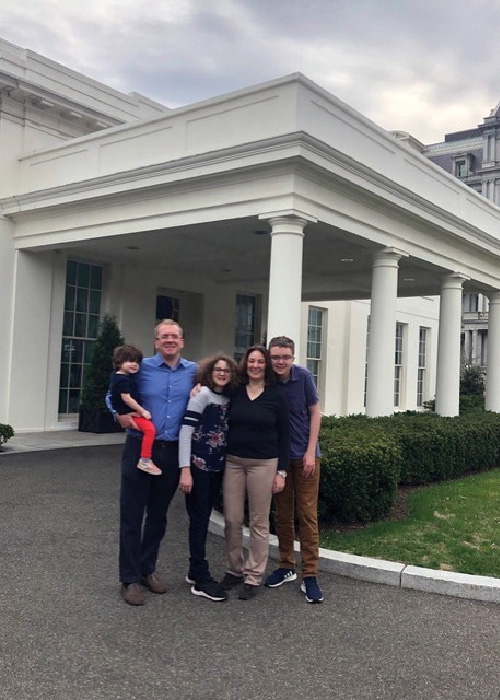
Julie Stufft with her family in front of the White House during her tenure on the National Security Council.
Detailed to the NSC during a time in which some foundational State Department practices and policies were questioned in the White House, Ms. Stufft—sometimes the only career State Department official in the room—sought not only to offer the best policy advice, but to be the best representative of the U.S. Foreign Service to those unfamiliar with career diplomats. She brought others from State into the effort and saw that everyone who worked closely with them gained a deeper understanding of the professionalism, creativity and determination of FS personnel.
“In an environment often characterized by a lack of trust between career officials and political appointees,” she tells the FSJ, “I saw senior White House staff and other political appointees who, despite never having been exposed to this policy set, grasp the importance of protecting and advising Americans abroad and strongly advocate for that position. I was nominated for this award by leadership who understand the inherent value of constructive dissent; but I won’t forget that they had more to lose in their advocacy than I did, and they did the right thing.”
Ms. Stufft feels strongly about the importance of constructive dissent. “As a deputy chief of mission, I finally understood the essential role of constructive dissent in foreign policy making,” she says. “I think early in our careers, we may wonder if dissent is really compatible with adhering to the chain of command—we picture dissenters as lone wolves rebuked by their supervisors for eschewing the policy process. On the contrary, I’ve never had a supervisor who did not appreciate well-considered opposing viewpoints. As DCM, I was thrilled to have someone on my staff say, ‘Julie, I think we need to rethink this policy, and here’s why.’ Consider constructive dissent as part of the policy process, not separate from it.”
Julie M. Stufft currently serves as managing director for visa services in the Bureau of Consular Affairs. A career member of the Senior Foreign Service, Ms. Stufft previously served as DCM in Moldova and Djibouti. She has also served in Russia, Ethiopia and Poland, as well as in the State Department Operations Center. She was a 2014-2015 Fellow to Seminar XXI at MIT’s Center for International Studies. Ms. Stufft is originally from Ohio and holds degrees from Case Western Reserve University and Duke University. She speaks Russian, Romanian, French and Polish.
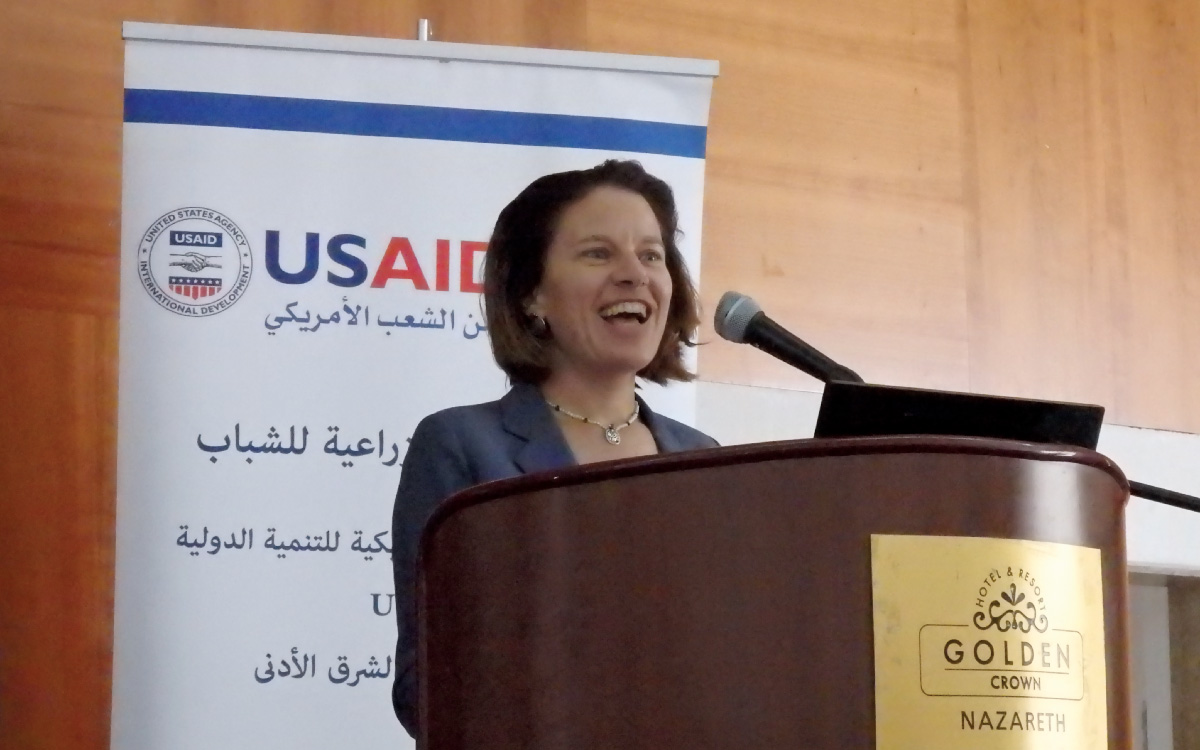
Monica Smith speaking at a USAID event with implementing partners in Nazareth, Israel, in 2017.
Christian A. Herter Award for a Senior Foreign Service Officer
MONICA SMITH: STANDING UP FOR THE RULE OF LAW
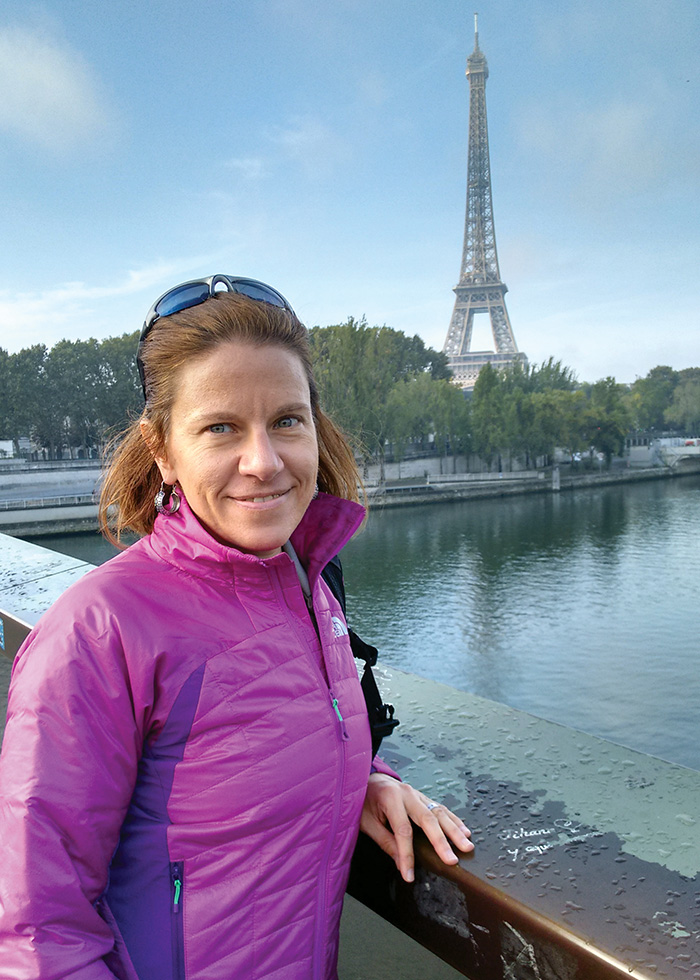
Monica Smith.
Monica Smith strongly advocated changing the way USAID’s West Bank and Gaza Mission engaged in the Gaza water sector, given the pervasive influence of Hamas there. In so doing, she persistently challenged the approach of mission management, at great personal cost. Her astute assessment of the risk of inadvertently assisting a terrorist actor led to a significant shift in the way the mission operated in Gaza and the West Bank.
Based in Tel Aviv as the senior resident legal officer for USAID’s WBG mission, Ms. Smith was there in part to help the mission navigate an extremely fluid foreign assistance environment. She advised the mission on policy restrictions regarding terrorist organizations and the provision of support in Gaza.
Providing economic assistance in Gaza is complicated by the fact that Hamas, a designated terrorist organization, controls the territory. U.S. legislation makes it a crime to provide material support to terrorist organizations. There was real concern that USAID funds for Gaza could be diverted to assist Hamas. The WBG mission also experienced intense scrutiny via oversight from Congress and high-level interest from the White House, especially in connection with U.S. peace efforts in the region.
After the 2014 war between Israel and Hamas, USAID invested heavily in constructing water and sanitation infrastructure in Gaza to help prevent a humanitarian crisis. To operate in Gaza, the mission relied on carefully documented legal and policy decisions made in Washington. However, in 2018, political and economic relationships shifted, calling into question the ability of the mission to rely on previous authorizations and, potentially, putting the continued implementation of U.S. government–funded construction projects at risk.
Ms. Smith determined that two steps were necessary: The mission needed to thoroughly vet specific individuals and consult with various offices in Washington before proceeding with economic assistance activities in Gaza. (The West Bank/Gaza vetting program was mandated by the United States Congress.) She drafted a detailed memo for officials in Washington, laying out the programmatic history, legal guidance, input from the technical office, policy implications and next steps. She then met with mission management to advise on these issues.
Although Ms. Smith’s advice was based on her review of more than a decade of existing policy and legal guidance on the topic, mission management strongly pushed back, voicing their disagreement through various channels.
In the end, Ms. Smith and the technical office (led by Cybill Sigler) devised a solution that allowed USAID-funded water activities in Gaza to be completed in compliance with U.S. law. Ms. Smith and the technical office proposed that the mission negotiate with the Palestinian Water Authority in Ramallah, in the West Bank, which agreed to designate a new point of contact for ongoing construction issues. Ultimately, Ms. Smith’s efforts allowed the mission to continue the critical work of bringing clean drinking water to more than one million Gazans.
“This award has special meaning for me because as a lawyer, I feel called to uphold and promote the rule of law, even when it is difficult to do so,” Ms. Smith says.
Being a leader, and a person in a position of authority, gives us a special responsibility to speak up, encourage discussion of difficult issues and support our colleagues who do the same.
—Monica Smith
She says the late civil rights hero and congressman John Lewis, and his advice to get into “good trouble,” serves as an inspiration. She hopes that in the future, more female Senior Foreign Service officers will be recognized for constructive dissent. Historically, a majority of Christian A. Herter award winners have been men (38 out of 46).
“Being a leader, and a person in a position of authority, gives us a special responsibility to speak up, encourage discussion of difficult issues and support our colleagues who do the same,” she says. “This applies to Foreign Service officers of all ranks—we are all leaders in our own way. At the same time, we cannot be blinded by a desire to be constantly liked or lauded. Sometimes doing the right thing means that you will make some people unhappy.”
Monica Smith, a Senior Foreign Service officer, currently serves as the resident legal officer for USAID/Colombia and lives in Bogotá with her husband. Previously, she served as the special senior legal adviser for USAID’s Office of the General Counsel. She has also served as a USAID lawyer in Islamabad, Budapest, Amman and Cairo. Moreover, she served as the acting mission director during the close-out of the USAID Regional Service Center in Budapest.
Ms. Smith is a graduate of Harvard Law School and earned her bachelor’s degree in political science at the University of Pennsylvania. While a law student, Ms. Smith interned with the All-India Democratic Women’s Association in New Delhi, researching systematic gender bias in the Indian courts. She also volunteered in Boston as an asylum and refugee case worker. She speaks German and Spanish, and a bit of French and Arabic. She is an accomplished triathlete and once spent a year and a half traveling by bicycle around the world.
William R. Rivkin Award for a Mid-Level Officer
JASON SMITH: RECOGNIZING THE IMPORTANCE OF WORDS
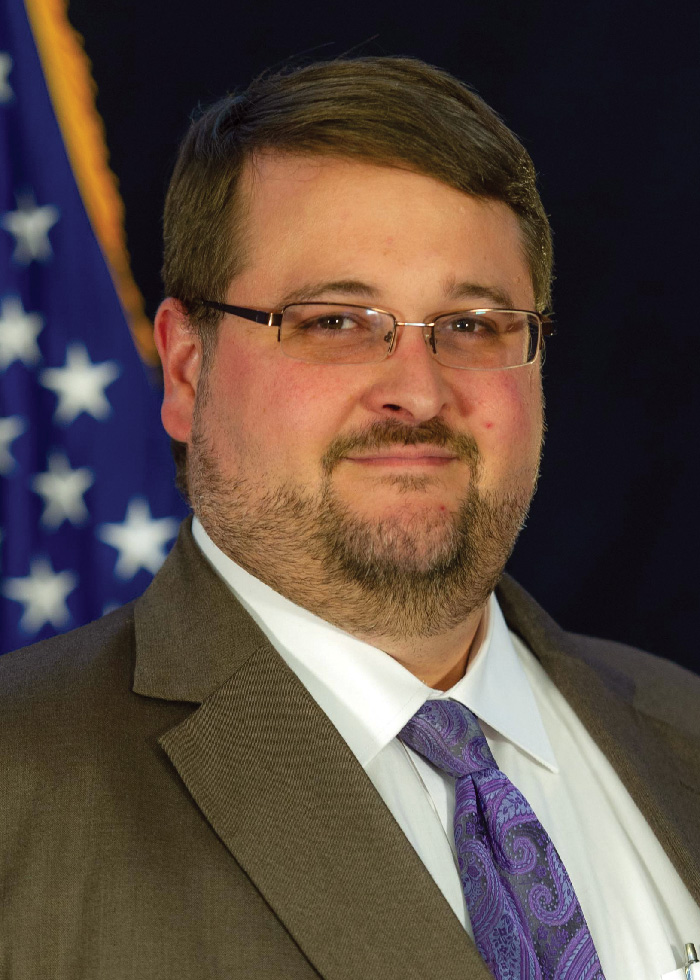
Jason Smith.
U.S. Embassy Jerusalem Political Officer Jason Smith used various methods of constructive dissent to help direct and shape U.S. policy on the Israeli-Palestinian conflict, one of the most politically charged and controversial American foreign policy issues. His objectivity, intellectual integrity and moral courage were a model for Foreign Service officers at Embassy Jerusalem and throughout the Service.
Recognition of Jerusalem as Israel’s capital and release of the U.S. Vision for Peace shifted decades of U.S. policy on the conflict. In this challenging environment, Mr. Smith was the embassy lead working with the Muslim and Christian communities in Jerusalem.
Mr. Smith raised concerns over public remarks by Embassy Jerusalem leadership and written content that appeared to imply a preference in U.S. foreign policy for a specific religious narrative about Jerusalem’s holy sites and the ongoing conflict. He raised his concerns through official embassy channels and, in coordination with his supervisory chain, presented his views to embassy leadership.
Mr. Smith conveyed the effect that these remarks and content had personally on officers at post and on the diverse and multireligious embassy team, as well as the potential effect on interfaith relations and religious violence in the embassy’s area of responsibility. As a result, the embassy subsequently expressed willingness to expand engagement with faith leaders and different communities on the conflict, an important signal of U.S. objectivity for both the embassy community and external audiences.
Later, when embassy leadership proposed using new terminology to refer to a specific community, Mr. Smith again raised concerns about the impact this could have, both on colleagues working at the embassy and on engagement with and reporting on this community. He organized meetings with concerned colleagues and embassy leadership to discuss the matter. He also raised the issue with AFSA and through other department channels.
Dissent does not need to be a solo journey. I was privileged to be able to work with a number of exceptional colleagues who shared my concerns and joined with me in raising them, not only at post but in Washington.
—Jason Smith
Mr. Smith worked with colleagues to submit a dissent cable raising the concerns to State Department leadership. State leadership then used his constructive dissent, policy input and alternatives to engage embassy leadership in finding alternative language for use in public documents that addressed some of Mr. Smith’s concerns while upholding strategic American policy decisions included in the U.S. Vision for Peace.
“Words are important, especially for us,” Mr. Smith tells the FSJ. “As diplomats representing the United States and American values, our choice of words—whether they are inclusive or exclusive, and how they can be interpreted by the people in the countries where we work—can have an immense impact, for both good and ill, on our work to advance U.S. interests.”
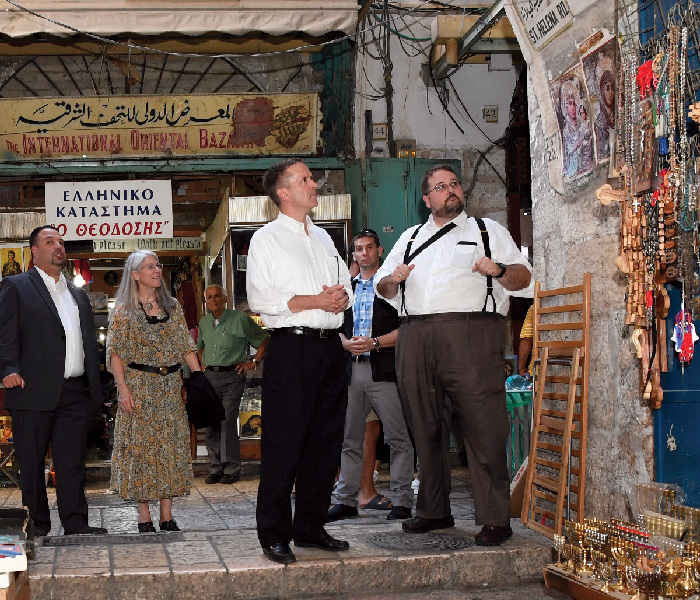
Jason Smith, at right, leads then USAID Administrator Mark Green and his delegation on a walk through Jerusalem’s Old City in 2019.
Mr. Smith took away two important lessons from the experience. “First, dissent can and should be empowering, and good leadership—and trust in that leadership—is critical to achieve that. Good leaders will take the time to listen to different perspectives, even if they don’t agree with them, and they will support those individuals in doing so,” he tells the Journal, adding that he personally felt empowered by leaders who took the time to listen and consider his concerns.
“Second, dissent does not need to be a solo journey,” he says. “I was privileged to be able to work with a number of exceptional colleagues who shared my concerns and joined with me in raising them, not only at post but in Washington. I am honored by being selected for this award, but must recognize and express my deep appreciation for those others who also raise their voices when needed, and for those who listen.”
Jason Smith has served as a political officer in the Palestinian Affairs Unit of U.S. Embassy Jerusalem since 2019. Prior to that, he served for a year in the political section of U.S. Consulate General Jerusalem. With the State Department since 2008, he has also served as the human rights and labor officer in Tegucigalpa; in the Office of the Coordinator for Cuban Affairs in Washington, D.C., during the reestablishment of diplomatic relations between the United States and Cuba; and in Islamabad and Damascus.
Prior to working for State, Mr. Smith worked in Sri Lanka responding to the 2004 tsunami, at a nongovernmental organization in Washington managing a USAID Cuba program and as a missionary in Paraguay, where he learned Spanish (mixed with Guarani). He speaks Spanish, and some Arabic and Urdu. He has a bachelor’s degree in political science and a master’s degree in international development. The son of Foreign Service officers, Jason has lived in the Middle East, the Indian subcontinent and Latin America, but currently calls Maryland home.
W. Averell Harriman Award for an Entry-Level Officer
LINDSAY DANA: ENDING GENDER BIAS ON VISA APPLICATION FORMS
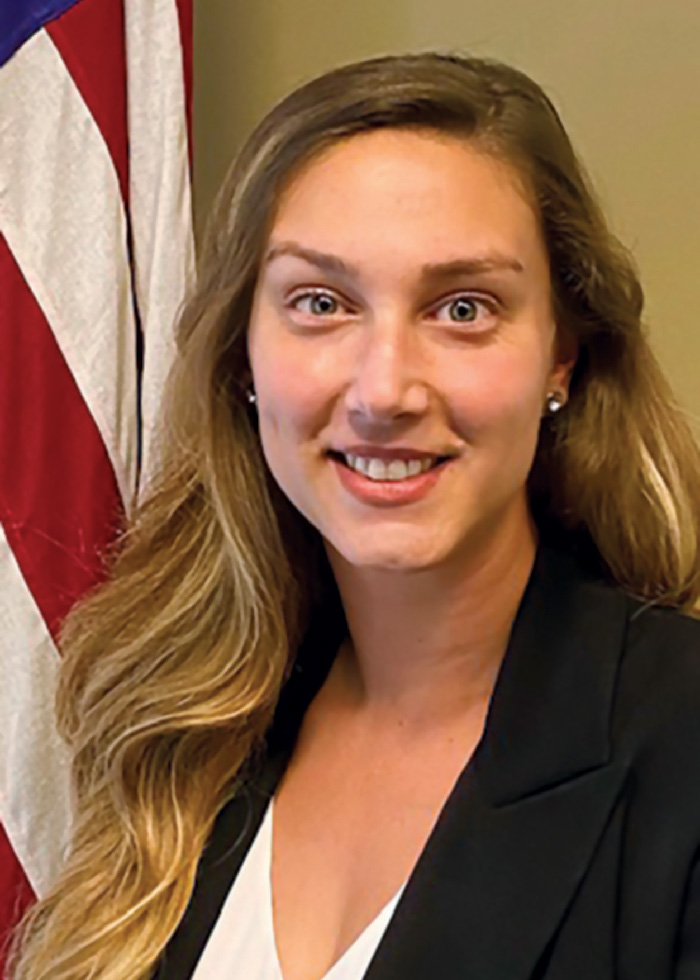
Lindsay Dana.
During her assignment as a consular officer in Bogotá, Lindsay Dana saw that female non-immigrant visa (NIV) applicants were prompted by the online application form through a shorter series of questions than was asked of male applicants, causing important information gaps for consular adjudicators. Ms. Dana worked with post management and the Bureau of Consular Affairs to push for a fix, resulting in a department-wide correction to equalize NIV online application questions for all genders as of June 2020.
For years, the DS-160 online application form had been configured to ask male applicants a more extended series of questions related to their previous employment, international travel, education, and participation in the military or in paramilitary groups. Women were asked a much shorter and less informative series of questions. This discrepancy had no apparent rational basis; it was based simply on outdated gender profiles. It was particularly troublesome in Colombia, where travel, education and employment are highly relevant to evaluating an applicant’s ties, and where large paramilitary organizations, whose membership is estimated at 20 to 30 percent female, have operated for years.
“Since consular officers seek—often under time pressure—to establish an applicant’s economic ties to their home country, I saw that women, who might have had significant work experience, multiple degrees or diverse travel, were being inherently disadvantaged by this configuration,” Ms. Dana tells the FSJ. “Additionally, from a national security standpoint, it was concerning that consular officers had a more limited capacity to judge security threats from female applicants.”
Ms. Dana noticed the problem and brought it to the attention of the consular section’s management. She worked with management to make the case to the Bureau of Consular Affairs for a change, noting both the issue of inequality and the national security importance of asking questions that could highlight concerns of visa misuse, technology transfer, paramilitary ties or unusual travel.
We can either shrug and let issues continue to cause problems for the department, or we can dissent. I hope this example helps encourage my fellow entry-level officers to choose the latter.
—Lindsay Dana
“I did what was in my power at post to mitigate these concerns, and developed training for my colleagues on ways to balance those gender inequalities by verbally asking additional questions during the interview of female applicants,” she says, given that she was unsure of what final action would be taken and when.
“After written advocacy and consistent follow-up with Washington offices over the next year, I was thrilled to see the requested change take final effect in early June 2020. The worldwide online application form now asks both male and female applicants the same full series of questions.”
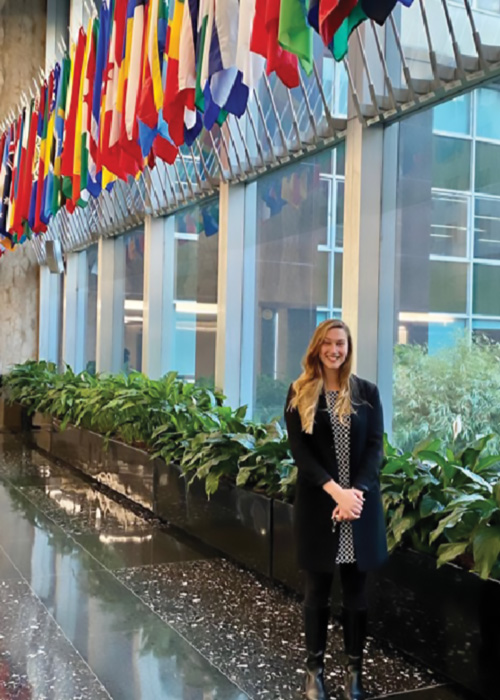
Lindsay Dana in the Harry S Truman Building.
Ms. Dana’s persistent advocacy for this change and her willingness to challenge the way things had always been done played a big role in prioritizing this fix. Every visa decision is a national security decision, CA stresses, and the additional information adjudicators now have, thanks to Ms. Dana’s advocacy, means these decisions will be better informed.
“The gender-specific configuration of prompts was an unfortunate relic that disadvantaged female applicants from explaining their full background, and placed higher security reporting standards on male applicants,” she observes.
Ms. Dana offers thanks to “those who worked tirelessly in Washington to bring this change into effect. I’m grateful to my consular managers who supported my advocacy, and to my colleagues who followed this issue with me and celebrated its correction.”
She also talks about the importance of dissent, even when it seems too difficult to change a system. “We can either shrug and let issues continue to cause problems for the department, or we can dissent. I hope this example helps encourage my fellow entry-level officers to choose the latter,” she tells the Journal.
She attributes her persistence to the conviction that the accomplishments of women worldwide—the efforts women make toward their education, their careers, their foreign travel experience—absolutely matter to the United States Department of State and those who represent it.
Lindsay Dana, an entry-level public diplomacy officer, is currently serving a consular tour in Manila after completing her consular tour in Bogotá. She was raised in California’s Bay Area, but now calls Denver home. She is a graduate of Colorado State University in Fort Collins, where she studied Spanish and biomedical science. She joined the State Department in 2017 with a background in international student affairs and university advising. She has traveled to more than 35 countries and had lived in Spain and Costa Rica prior to joining the Foreign Service.
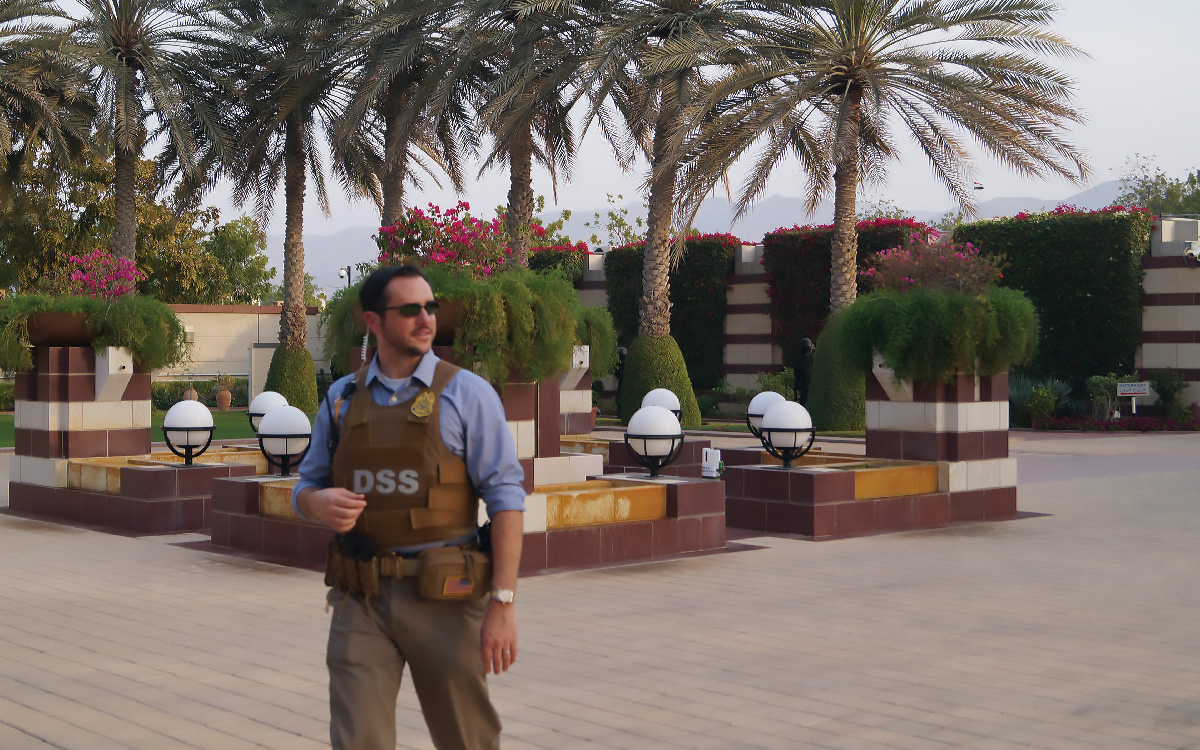
Dave Heddleston working in Oman in 2018.
F. Allen “Tex” Harris Award for a Foreign Service Specialist
DAVID “DAVE” HEDDLESTON: PROTECTING THOSE WHO PROTECT US
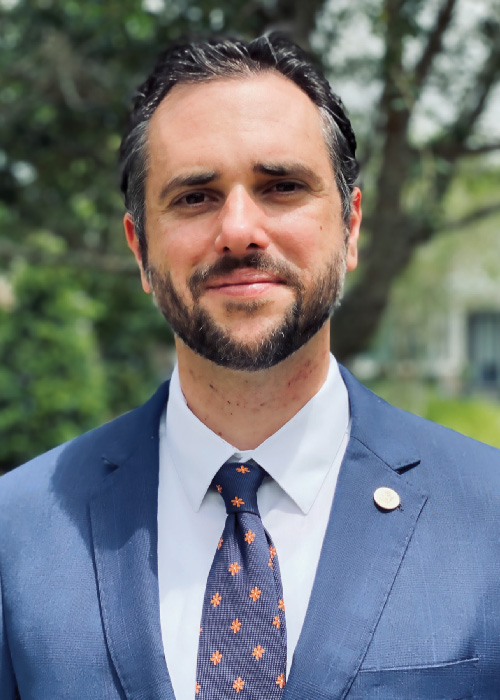
David Heddleston.
Dave Heddleston, a supervisory special agent for the State Department’s Diplomatic Security Service (DSS), says that one of the key ingredients to ensuring that diplomats stay safe is, literally, a vehicle.
At overseas posts, dedicated government-owned vehicles are made available to DSS special agents to protect personnel abroad; but, depending on the post, those vehicles sometimes are not available to DSS special agents serving as regional security officers with protective or investigative responsibilities after hours. DSS agents serving domestically generally have government-owned vehicles at their disposal for those purposes. Mr. Heddleston would like to see DSS agents serving overseas have the same access to government-owned vehicles as those serving domestically.
“I have experienced firsthand the difficulties and arbitrary decision-making that take place when regional security officers attempt to secure transportation designed to protect U.S. government personnel and their families working and living abroad,” Mr. Heddleston, who joined DSS in 2004, says.
“Some posts argue insufficient vehicles exist, while others have plenty of vehicles but refuse to allow DSS agents to utilize them,” he tells the Journal. “Foreign policy and fiscal budget planning remain lacking in this regard. Peers from other federal law enforcement agencies frequently express dismay that the department does not support the use of dedicated vehicles by all DSS agents assigned to a regional security office.”
In an extensively researched and compellingly written dissent channel cable (19 State 131254), Mr. Heddleston argued the case for the State Department and DSS to change overseas vehicle usage policy so regional security officers can provide a more secure environment for the conduct of U.S. foreign policy.
He argued that a uniform overseas policy that provides dedicated government-owned vehicles at any time of the week, day or night, to regional security offices would improve the emergency response capabilities of DSS agents assigned overseas and allow them to more efficiently and effectively carry out the myriad law enforcement and security functions for which they are responsible.
Mr. Heddleston urged the department to prioritize funding and resources to empower chiefs of mission and DSS personnel to provide equitable law enforcement and security services abroad.
He noted that DSS agents assigned to domestic field offices and various headquarters offices and divisions with protective and investigative responsibilities are provided individually dedicated government-owned vehicles for after-hours response, consistent with the capabilities of their federal law enforcement counterparts from other agencies. But no such program exists for DSS agents carrying out similar functions and responsibilities overseas.
While current policy allows for DSS personnel to negotiate the use of dedicated official vehicles for emergency response, Mr. Heddleston argued that such authorities and procedures should be grounded in official department policy and not subject to the whims of individual post management or changes in post leadership.
I am not the only member of the Foreign Service to vocalize concerns over DSS’ ability to deliver effective service to our constituents abroad. It is the actions of my dedicated colleagues and senior leadership in response that make my dissent relevant.
—David Heddleston
“I hope that my cable provides a one-stop resource justifying the use of dedicated vehicles for overseas law enforcement and security functions, the legal and federal precedence for such use, and the benefit of allowing DSS special agents to utilize vehicles instead of keeping them secured in motor pools,” he says.
Mr. Heddleston also discussed the importance of dissent for a healthy Foreign Service. “Meaningful dissent offers a mechanism for dedicated professionals to voice concern and offer recommendations to the most senior leaders, without alienating management and leaders who may concur with the concepts but not hold the authority to implement them,” he says.
“I am not the only member of the Foreign Service to vocalize concerns over DSS’ ability to deliver effective service to our constituents abroad. It is the actions of my dedicated colleagues and senior leadership in response that make my dissent relevant. I am proud that my dissent resonated with leaders, implementers and policymakers who shared similar concerns and took action to reexamine the department’s overseas law enforcement and security response measures.”
Mr. Heddleston currently serves as the first supervisory special agent at DSS’ newly established presence in Orlando, Florida. His previous overseas assignments include Iraq, Nigeria, Libya, Kenya and Oman. Domestically, he has served at the Washington Field Office, the Office of Special Investigations and the Office of Protective Intelligence Investigations, where he conducted extraterritorial counterterrorism and hostage investigations.
He began his federal law enforcement career in 2001 when he enlisted in the U.S. Army Military Police Corps, rising to the rank of sergeant. His overseas military deployments include two tours of duty during Operation Iraqi Freedom. He earned a bachelor’s degree in criminology from the University of South Florida. In 2019 and 2020, he earned master’s degrees in criminal justice administration and diplomacy through Norwich University.



